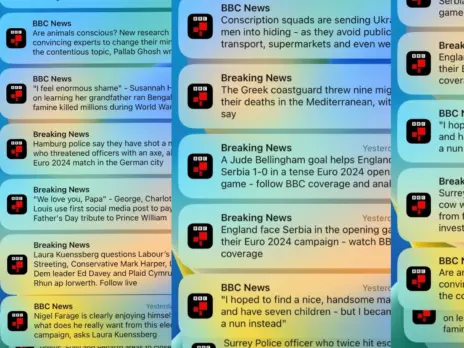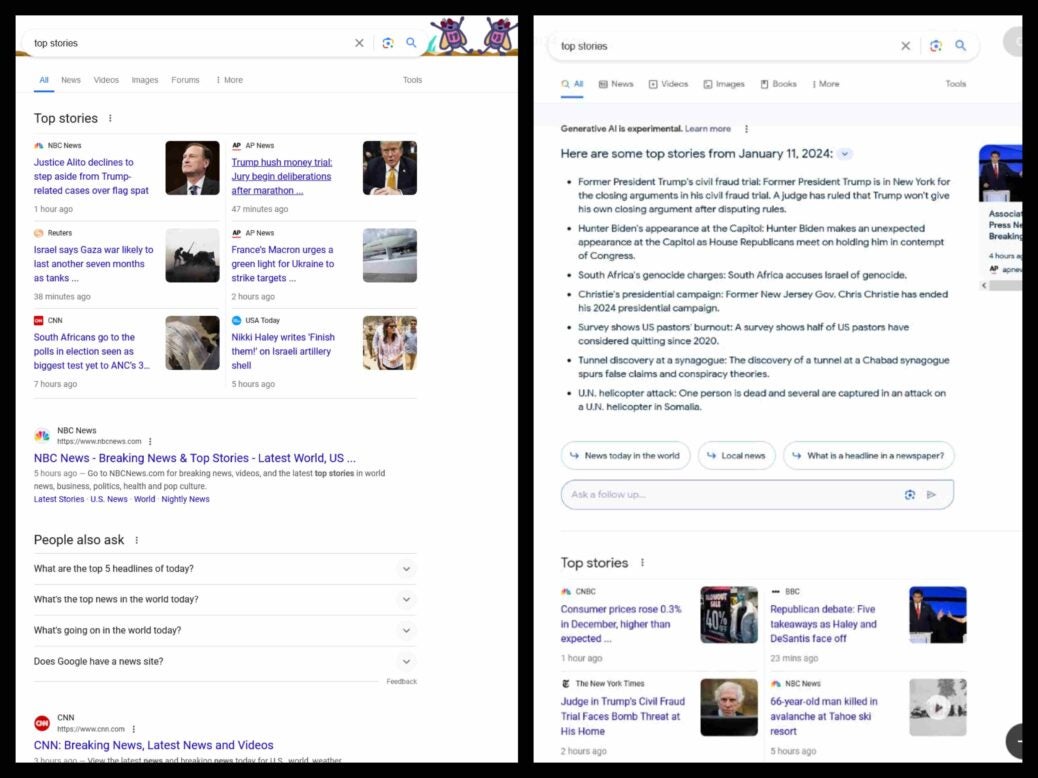
The dramatic impact of Google‘s AI-written summaries on search result visibility for publishers has been revealed through exclusive new research.
A Press Gazette-led investigation has found that AI-written summaries were returned for nearly a quarter of news-related search queries in mid-May in the US, with the result that organic links to publisher articles were pushed far down the page.
The research suggests that if this drop in search prominence equates to an equivalent drop in search rankings it would have a “devastating” impact on publisher clickthroughs for these key search terms.
Google insists that links contained in AI Overviews generate more clicks, but has declined to share any data on this. The research published today suggests that in many cases the AI Overviews contain no links at all (see examples below).
[Read more: Google and publishers: An unpredictable animal that could eat you at any time]
Google AI Overviews push publishers from top result in search to a full page-scroll down
Press Gazette and a consortium of leading publishers commissioned SEO agency Authoritas to analyse the impact of AI Overviews, previously called Search Generative Experience (SGE), on their search visibility. This was a joint investigation with Ricky Sutton’s newsletter Future Media.
The research was conducted by running search queries in the United States in mid-May, when AI Overviews were being widely deployed by Google in the country. Since then Google has scaled back the AI rollout because of widespread concerns being raised about the accuracy of results.
But the research provides insight into the possible impact AI Overviews will have if/when Google again rolls them out again more widely.
The research looked at 3,300 of the most important search terms for leading publications and found that AI-written summaries were offered as the top result in nearly a quarter of cases (23.7%).
From “Britney Spears” to “travel updates” to “latest news”, the research looked at the search terms that publishers said drive most of their Google traffic.
In some cases Google AI Overviews automatically appeared, and in others a snippet of the overview appeared and readers were invited to expand it.
In cases where an AI-written answer was offered by Google, the number one search result — which previously would typically have been held by a publisher — fell by an average of 980 pixels, or one page scroll.
In terms of prominence, the AI Overview pushed the first search result down to roughly the equivalent of position five, or lower, in organic search results.
The big unknown is whether a publisher will receive clicks if it is referenced in an AI Overview. Google has declined to reveal data on this and AI Overviews are evolving all the time, so Press Gazette is reluctant to make specific predictions about likely traffic drops. But the top organic Google result typically attracts around 40% of clicks according to some research, with clickthroughs declining to around 5% for position five in the search results.
So a publisher ranking top for a particular article on Google currently could see an 85% drop in the number of clicks to that article if the result was replaced with an overview for all readers. This will be particularly galling for publishers given that the AI-written overview is based on a summary of their journalism (see examples below).
David Buttle has previously written for Press Gazette about why AI Overviews appear to be an exercise in taking publisher content with little value given in return.
More than half of health-related search queries generated an AI summary
Google searches account for around a third of traffic to most news websites. So widespread rollout of AI Overviews could have a dramatic impact on overall publisher traffic (and therefore ad revenue).
The chart below shows the average number of pixels by which search results for various news-related search terms linking to outside sites have dropped in AI Overviews, compared to traditional organic results.
The research found wide variance in the proportion of search results returning AI summaries. Some 55% of health-related search queries returned an AI summary versus 9% of movie/TV show queries.
The research found that Google was returning AI-generated summaries for even very newsy searches, effectively setting itself up as a publisher in its own right.
This screengrab from early in the year reveals that a search for "top stories" returned a Google summary, rather than links to the stories themselves. In the AI Overviews version, the actual story links to publishers are relegated to 'below the fold' (or halfway point) of the page, a position where they are less likely to prompt clickthroughs.
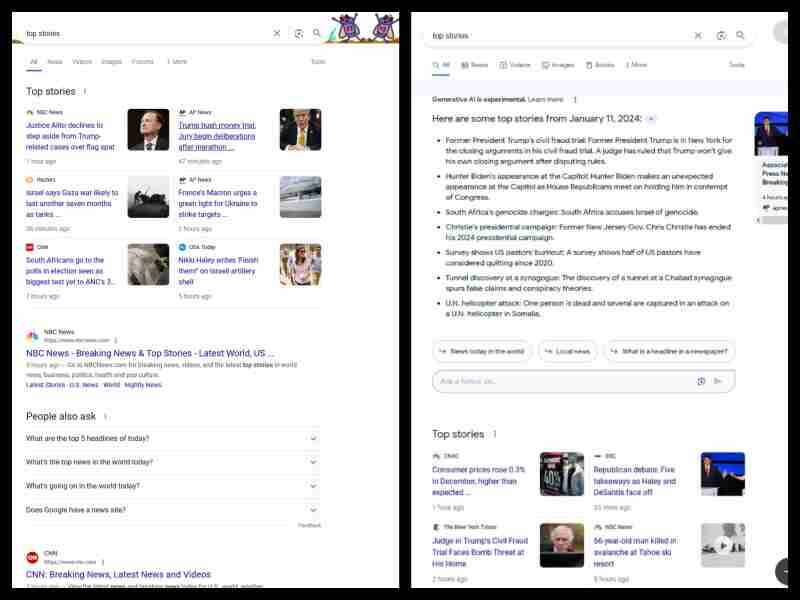
Google has even deployed AI Overviews to summarise editorial reports on contentious and legally delicate stories, like the issues relating to former BBC newsreader Huw Edwards.
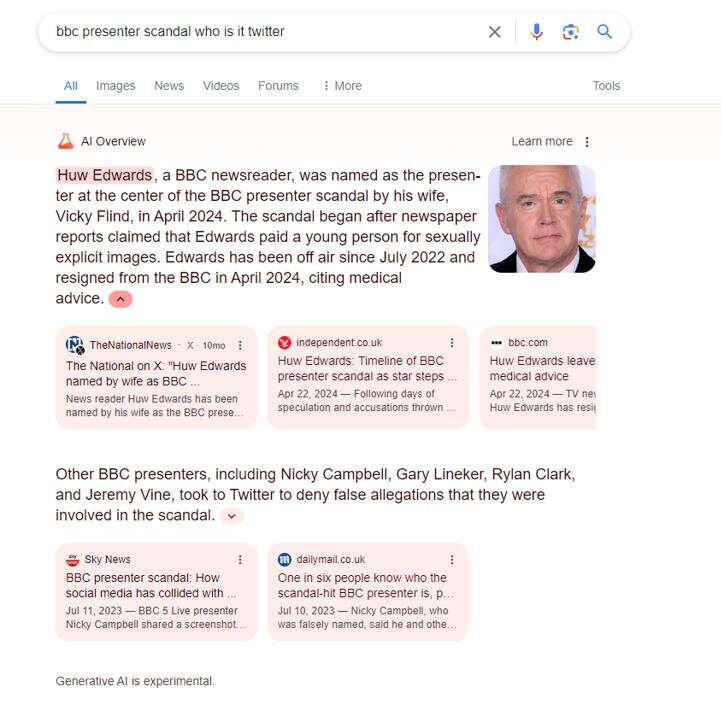
A search for "list of BBC presenters" returns Press Gazette as the fifth-ranked result on Google in the UK. When this search term was used on Google in the US during our study, the query returned a result dominated by an AI summary which is almost entirely inaccurate.
The AI Overview results included: George Alagiah (deceased), Huw Edwards (then suspended), Dermot Murnaghan (hasn't been a BBC news presenter since 2007), and Nick Clarke and Sir David Frost (both deceased).
The accurate and up-to-date news articles are now relegated far down the results (requiring two or three scrolls from the reader).

A search for "submarine missing" revealed how an AI summary replaced a publisher-written article as the top search result for information about a submersible which sank whilst investigating the wreck of the Titanic last year. The picture on the right (below) shows what happens what the AI-written result is expanded.
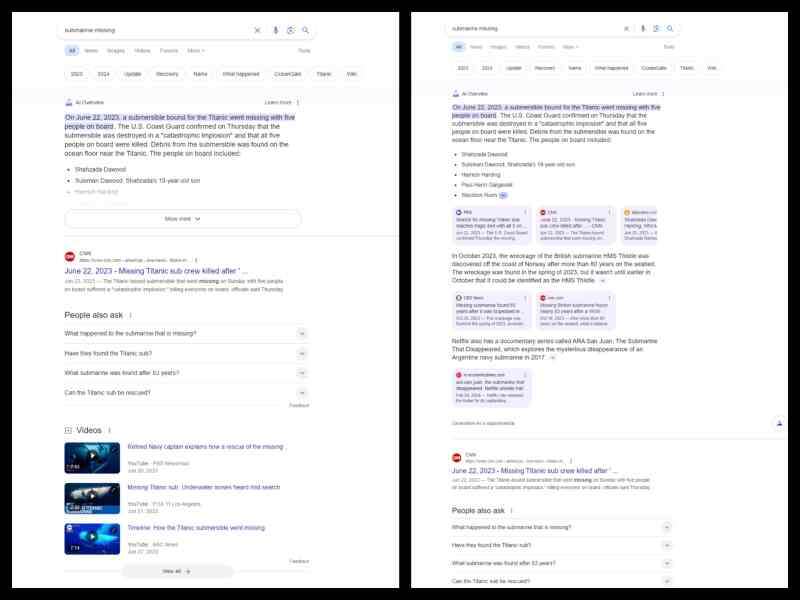
Google AI Overviews: What does it all mean for publishers?
Authoritas chief executive Laurence O'Toole led the research into the impact of AI Overviews on Google search. He said: "With only 23.7% of keywords generating AI Overviews, this study signals a much lower penetration of generative AI in the search results than we have seen in previous SGE research studies.
"For example, a similar Authoritas study of brand and product related terms in March 2024 found a 91.4% penetration and an earlier study of popular ecommerce terms in January 2024 showed an 86.8% penetration of SGE.
"We believe this may well be a timing issue, as the data was collected over several days, week commencing 13 May 2024. This coincides with Google’s announcement that it was starting to roll out AI Overviews to all users at Google I/O on 14 May."
Authoritas found Google AI Overviews are currently being returned for around 10% of keywords, up from 4% a few weeks ago when AI Overviews were the subject of widespread criticism for returning inaccurate, and sometimes dangerous, results.
O'Toole said: "What is evident from a large number of private and public SGE studies is that Google has the ability to serve an AI answer for 100% of queries if it so chooses; at the moment it is choosing not to.
"Google will always shy away from using a large language model to generate responses for certain sensitive topics, but the integration of generative AI across all commercial niches is inevitable.
"Google is reported as saying that it will not break down impressions and click data for AI Overview links in Google Search Console, so it is going to be very difficult to assess in the short-term at least whether Google’s assertion that these AI Overviews will generate more clicks through to websites than traditional web results.
"This study shows that when AI Overviews are shown in the search engine results page, the top organic ranking slips down the page by around one page scroll. Our previous clickthrough rate studies give us clues as to how devastating a significant drop in rankings can be for a website."
What does Google have to say?
Google's blog post responding to widespread concerns about inaccurate Google AI Overviews said: "People use AI Overviews as a jumping off point to visit web content, and we see that the clicks to webpages are higher quality — people are more likely to stay on that page, because we’ve done a better job of finding the right info and helpful webpages for them.
“We see that the links included in AI Overviews get more clicks than if the page had appeared as a traditional web listing for that query. As we expand this experience, we’ll continue to focus on sending valuable traffic to publishers and creators.”
In the UK currently a subset of UK Google users see AI Overviews by default on certain queries. No date has been announced for the full rollout.
Publishers concerned about AI Overviews rollout
Press Gazette shared our research with leading UK publisher trade bodies the News Media Association (which represents national and regional newspaper publishers) and the PPA (which represents the magazine and specialist publishing industry).
NMA chief executive Owen Meredith said: “Google’s stated mission is to ‘organise the world's information and make it universally accessible’ by sending visitors to websites. Introducing GAI into search and AI Overviews that directly synthesise and present information to the user risks discouraging users from clicking through to the original links, in turn threatening the business model of those who invest in journalism and quality news and information. All of this is seemingly without consultation, transparency, permission, or reward for the original curators and rightsholders of that information.
“This potentially dangerous move ultimately risks undermining the diversity and quality of news and information available online. In that event, we all lose.”
PPA chief executive Sajeeda Merali said: "As the voice of the publishing industry, the PPA is committed to advocating for fair practices that ensure the value of our members' original content is recognised and protected. We urge Google to work collaboratively with publishers to develop solutions that support quality journalism and maintain the integrity of the publishing ecosystem.
"This is also in the best interest of consumers so that the information they are searching for is always surfaced from a trusted source. The implementation of the Digital Markets Bill will be a priority for the next government, and we look forward to seeing this implemented.”
Methodology
Six publishers shared around 500 of their leading traffic-generating search keywords to help Authoritas understand the impact of AI Overviews on traffic. They were: Press Gazette, Reach, DMG Media, Hearst, Future and Australian media and marketing publisher Mi3.
Authoritas used its SGE Rank Tracker to generate thousands of searches using the specified keywords. It then logged instances where AI-generated results were triggered.
Email pged@pressgazette.co.uk to point out mistakes, provide story tips or send in a letter for publication on our "Letters Page" blog


